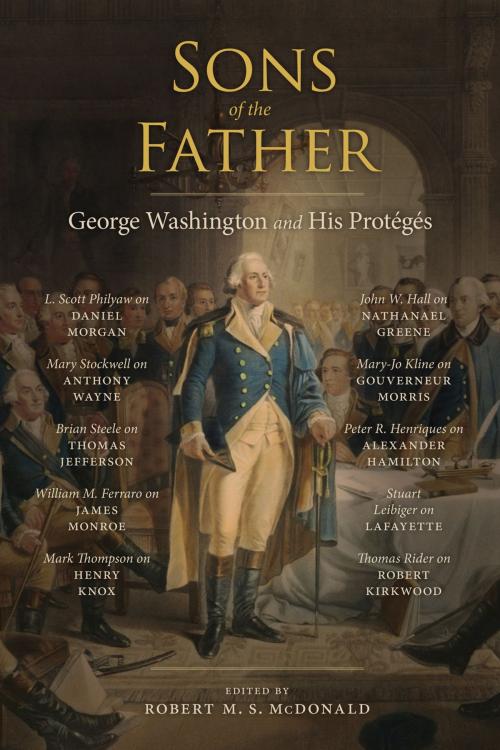Sons of the Father
George Washington and His Protégés
Nonfiction, History, Americas, United States, Revolutionary Period (1775-1800)| Author: | ISBN: | 9780813934396 | |
| Publisher: | University of Virginia Press | Publication: | September 24, 2013 |
| Imprint: | University of Virginia Press | Language: | English |
| Author: | |
| ISBN: | 9780813934396 |
| Publisher: | University of Virginia Press |
| Publication: | September 24, 2013 |
| Imprint: | University of Virginia Press |
| Language: | English |
Whether acting as a military officer or civilian officeholder, George Washington did not possess a reputation for glad handing, easy confidences, or even much warmth. His greatest attributes as a commander might well have been his firm command over his own emotions and the way in which he held himself above if not apart from the men he led. Understanding the full range of Washington's leadership, which embraced all shades of persuasion and coercion as well as multiple modes of command and solicitude, requires the examination of his influence on the lives, careers, and characters of the members of a diverse fraternity of younger men.
In Sons of the Father, leading scholars analyze Washington's relationships with men such as Daniel Morgan, Anthony Wayne, Thomas Jefferson, James Monroe, Henry Knox, Nathanael Greene, Gouverneur Morris, Alexander Hamilton, and the Marquis de Lafayette. The men on whom this volume focuses were not all his closest associates. Yet all are important figures in that their interactions with Washington provide glimpses into various aspects of his capacities for management, motivation, control, and the cultivation of talent. The essays in this volume demonstrate Washington's consistency in treating all these men differently, for different reasons, at different times. It was perhaps part of his genius to recognize the individuality of the men with whom he interacted as well as the shifting requirements of changing circumstances.
Contributors: Fred Anderson (University of Colorado, Boulder) * Theodore J. Crackel (University of Virginia) * William M. Ferraro (University of Virginia) * Jack P. Greene (Johns Hopkins University) * John W. Hall (University of Wisconsin–Madison) * Peter R. Henriques (George Mason University) * Mary-Jo Kline (University of Virginia) * Stuart Leibiger (La Salle University) * L. Scott Philyaw (Western Carolina University) * Thomas Rider (United States Military Academy) * Brian Steele (University of Alabama at Birmingham) * Mary Stockwell (Louisiana State University Shreveport) * Mark Thompson (University of North Carolina at Pembroke)
Whether acting as a military officer or civilian officeholder, George Washington did not possess a reputation for glad handing, easy confidences, or even much warmth. His greatest attributes as a commander might well have been his firm command over his own emotions and the way in which he held himself above if not apart from the men he led. Understanding the full range of Washington's leadership, which embraced all shades of persuasion and coercion as well as multiple modes of command and solicitude, requires the examination of his influence on the lives, careers, and characters of the members of a diverse fraternity of younger men.
In Sons of the Father, leading scholars analyze Washington's relationships with men such as Daniel Morgan, Anthony Wayne, Thomas Jefferson, James Monroe, Henry Knox, Nathanael Greene, Gouverneur Morris, Alexander Hamilton, and the Marquis de Lafayette. The men on whom this volume focuses were not all his closest associates. Yet all are important figures in that their interactions with Washington provide glimpses into various aspects of his capacities for management, motivation, control, and the cultivation of talent. The essays in this volume demonstrate Washington's consistency in treating all these men differently, for different reasons, at different times. It was perhaps part of his genius to recognize the individuality of the men with whom he interacted as well as the shifting requirements of changing circumstances.
Contributors: Fred Anderson (University of Colorado, Boulder) * Theodore J. Crackel (University of Virginia) * William M. Ferraro (University of Virginia) * Jack P. Greene (Johns Hopkins University) * John W. Hall (University of Wisconsin–Madison) * Peter R. Henriques (George Mason University) * Mary-Jo Kline (University of Virginia) * Stuart Leibiger (La Salle University) * L. Scott Philyaw (Western Carolina University) * Thomas Rider (United States Military Academy) * Brian Steele (University of Alabama at Birmingham) * Mary Stockwell (Louisiana State University Shreveport) * Mark Thompson (University of North Carolina at Pembroke)















